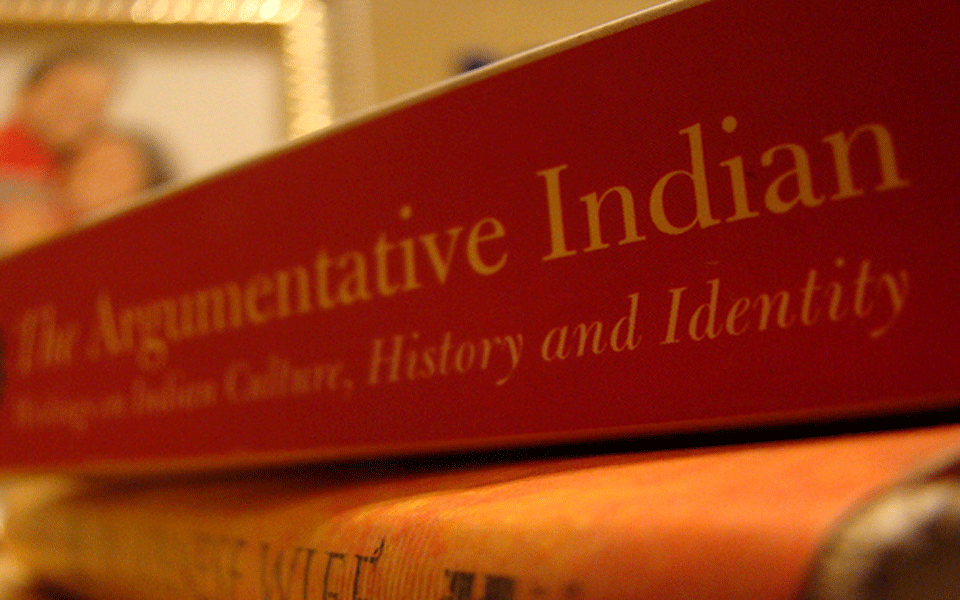It is a miracle that this vital documentary throwing light on one of India's brightest minds, ever made into theatres. Miracle, because the film's architect and director Suman Ghosh (whose feature film "Nobel Chor" fictionalising the real-life theft of Rabindranath Tagore's Nobel prize) had to fight a long and hard battle with the Indian censor board to stop some hard-hitting comments on India's politics from being cut.
It is also a miracle to see Amartya Sen reach the age of 84 when 66 years ago, the doctors had given him only five years to live after he was detected with mouth cancer. We hear Sen's mother speak of that miracle -- of her son surviving a serious death to become one of India's most perspicuous minds. We also hear Sen describe the self-diagnosis that he undertook and which probably saved his life.
What comes across in the hour-long documentary is the Nobel laureate's tenacity and obstinacy. He does bend but you won't catch him tripping over his thoughts or contradiction his own views. He is not immovable in his opinions either.
The documentary is essentially a two-part interview conducted by the famed economist Kaushik Basu, conducted with a 15-year gap between the two conversations. Although the conversations per se are illuminating and deeply reflective of Sen's intellect, I craved for more insight into his heart rather than focusing almost entirely on the mind.
Sen's mother comes forward with her cursory thoughts and she is specially disarming as she recalls her son's phone call about winning the Nobel prize. We see Sen receiving the Nobel prize early in the narrative. Just why vital events from his life occupy a particular place in the documentary is not explained.
But where are Sen's two daughters? We would have loved to see them speak on their father. While the documentary sheds illuminating light on the Nobel laureate's academic pursuits, there isn't enough on his other roles in life. This perhaps is a conscious omission indicative of the lacuna that all intellectual minds are familiar with.
A life so devoted to the pursuit of knowledge tends to preclude domestic duties. What we see in the documentary is the academician, the teacher, the philosopher and the intellectual, but seldom the man in his domestic environment.
Towards the end, the discourse veers towards, what else, mortality. But Sen seems uncomfortable discussing that subject. He is far more expansive talking on his growing up years in Dhaka, and on Mahatma Gandhi.
"I am not a nationalist. But I am still quite proud of my country," Sen says at one point of his conversation.
It is a defining moment in the discourse that tells us why a mind as sorted as Amartya Sen needs to be stubborn on national issues.
You can only aspire to greatness if you shun mundane roles.
"The Argumentative Indian" is a documentation of a life careening towards immortality. Not to be missed by any Indian.
Let the Truth be known. If you read VB and like VB, please be a VB Supporter and Help us deliver the Truth to one and all.
Hyderabad (PTI): Telangana Chief Minister A Revanth Reddy met Union Home Minister Amit Shah in Delhi on Wednesday night and urged him to increase the sanctioned strength of IPS officers to the state in view of its growing administrative and security needs.
The two leaders also discussed the recent surrender of several senior Maoist leaders before the Telangana Police and other issues.
"During the meeting, the two leaders discussed the issue of Maoist surrenders and their rehabilitation. The chief minister informed Shah that significant improvements in policing have taken place in Telangana over the past two years," an official release here said.
Highlighting that 591 Maoists have laid down their arms and joined the mainstream of society during this period, the chief minister said the state government was providing them compensation and rehabilitation assistance as per the rules.
He requested the Union home minister to extend financial support from the central government for development works in the backward regions of the state.
Reddy also urged Shah to increase the sanctioned strength of IPS officers to the state from 83 to 105 in line with the state's growing administrative and security needs, the statement said.
The first cadre review after the formation of Telangana was conducted in 2016, while the next review, due in 2021, was delayed and finally carried out in 2025. Even then, only seven additional IPS officers were allocated to the state, the chief minister informed Shah and requested that the third cadre review be conducted in 2026 as per the schedule.
Reddy explained that Telangana, like the rest of the country, is facing several modern challenges, including cybercrime, drug trafficking, white-collar crimes, and other emerging security threats.
He highlighted the reorganisation of the Hyderabad, Cyberabad, and Malkajgiri Police Commissionerates, the proposed formation of the Future City Commissionerate and the rapidly growing population in Hyderabad to underline the increasing administrative requirements of the state.





